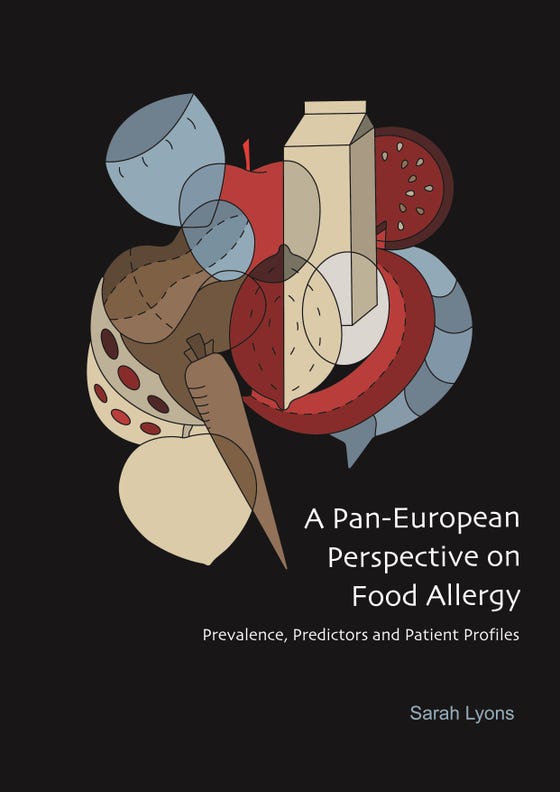Mar 11: Marked geographical variation in prevalence and nature of food allergy
Mar 11: Marked geographical variation in prevalence and nature of food allergy

Until now, it has been unclear how often food allergies occur in Europe. PhD research by Sarah Lyons at UMC Utrecht revealed that the prevalence of food allergy in children and adults across Europe shows considerable geographical variation and is influenced by food, pollen, and possibly microbial exposure. Patient history, skin prick testing and blood testing play important roles in diagnosis of food allergy. Models combining all these aspects of the food allergy diagnostic work-up were found to improve prediction of severity of tree nut allergies and may support decision making in clinical practice.
A food allergy is an abnormal immune response to food, mediated by IgE type antibodies. Symptoms can be mild or severe, and may include itchiness of the mouth and throat, swelling of skin and mucous membranes, hives, vomiting, diarrhea, trouble breathing, or low blood pressure. An allergic reaction typically occurs within minutes to two hours of exposure.
Scarcity of data
A considerable part of the population wrongly labels a food adverse reaction as a food allergy. Reliable data on the prevalence, type and distribution of food allergy in Europe are scarce. In her thesis, Sarah Lyons (Department of Dermatology & Allergology, UMC Utrecht) investigated patterns of and predictors for food allergy in general and outpatient populations from Bulgaria, the Czech Republic, France, Greece, Iceland, Italy, Lithuania, the Netherlands, Poland, Spain, Switzerland and the United Kingdom.
Variation in prevalence
The PhD work by Sarah Lyons made use of the data from the EU-sponsored multicenter EuroPrevall study, the largest research project (16.935 school-age children and 17.295 adults) to investigate food allergies across Europe. The analyses revealed that food allergy is common: prevalence ranges from 0.3 percent in Greek adults to as high as 6 percent in Polish children and Swiss adults, with prevalence estimates of 2-3 percent in the Netherlands. Geographical variations in prevalence and causative foods are strongly influenced by environmental factors. In Northern/Central Europe, cross-reactivity with birch pollen is largely responsible for the many fruit (apple, peach, kiwi), vegetable (carrot, celery) and tree nut (hazelnut) allergies. Frequent seafood consumption in Spain and Iceland corresponds with these countries’ relatively high prevalence of fish and shrimp allergy.
Dog owership may protect
In an analysis of early-life environmental exposures, dog ownership in early childhood was confirmed to protect against later food allergies. Other previously reported protective early-life exposures, such as attending day care or growing up on a farm, had only limited impact.
Accurate prediction
The ‘gold standard’ diagnostic test for food allergy, oral food challenge, is burdensome and costly. Accurate diagnostic alternatives are therefore crucial. This thesis demonstrated that almost half of adults presenting with food adverse reactions can be correctly classified as non-allergic using only information directly available from patient history. Blood tests detecting allergy-related antibodies (IgE) can also decrease the need for challenges, but performance is variable per food and with age. Levels of IgE to specific allergenic proteins in hazelnut were shown not to distinguish between presence and absence of hazelnut allergy in Dutch adults, in contrast to previous findings in children. Estimating the risk of severe reactions is perhaps even more important than establishing food allergy. Statistical models combining information from patient history with results from blood and skin prick testing were found to accurately predict severity of tree nut allergy, potentially further reducing the demand for challenges in the future.
PhD defense
Sarah Lyons (1990, Cork, Ireland) defended her PhD thesis on March 11, 2021 at Utrecht University. The title of her thesis was “A Pan-European Perspective on Food Allergy – Prevalence, Predictors and Patient Profiles”. Supervisors were prof. dr. André Knulst (Department of Dermatology and Allergology, UMC Utrecht) and prof. dr. Ronald van Ree (Department of Experimental Immunology, Amsterdam UMC); co-supervisors were dr. Thuy-me Le (Department of Dermatology and Allergology, UMC Utrecht) and dr. Paco Welsing (Department of Rheumatology and Clinical Immunology, UMC Utrecht). Sarah Lyons will start in 2022 her dermatology residency program at UMC Utrecht.


